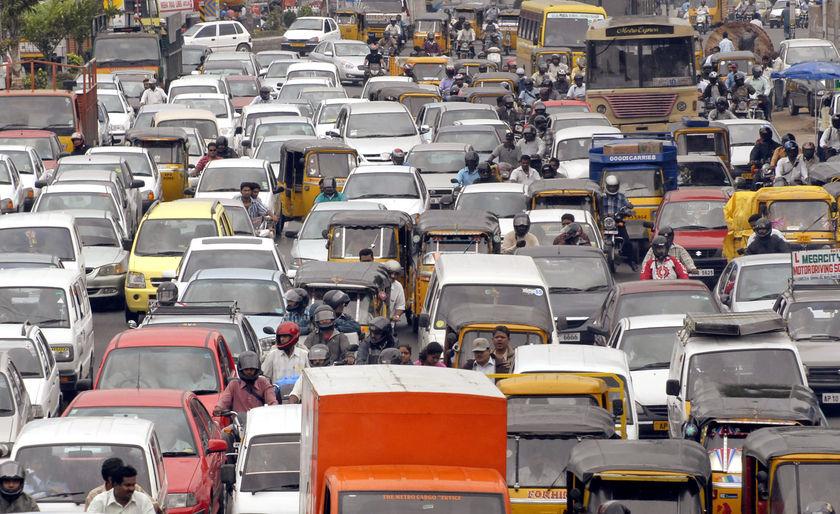Motor Workers Protest, Say Amendment Bill Will Hand Over Transport Sector to Corporates

While the BJP-led NDA government seeks to push the Motor Vehicles (Amendment) Bill 2016 through the upcoming winter session of the Rajya Sabha, workers of the road transport sector have been demanding that the Bill be repealed as it paves the way for privatisation.
The Bill, which seeks to replace the Motor Vehicles Act 1988, was passed in the Lok Sabha this April. But it was referred to a Select Committee of the Rajya Sabha for consideration after the opposition parties raised objections and demanded more time to study the Bill.
Nitin Gadkari, the Union Minister for Road Transport and Highways, has been projecting the Bill as being the panacea to the ills plaguing the road transport sector. The government claims it will make Indian roads safer and drastically reduce the chances of accidents as, among other proposals, it heavily hikes the penalties for traffic offences. India witnesses over 4.5 lakh accidents and 1.5 lakh fatalities on the road every year.
However, transport sector associations have been pointing out that instead of strengthening road safety and regulatory mechanisms, the proposed amendments are an attempt to hand over the core road transport sector – including licensing, registration, maintenance and spare parts market – to the corporates.
On October 13, more than 2,000 motor transport workers of Tamil Nadu gathered in Chennai to stage a massive protest and day-long strike against the Bill.
Seventeen organisations of motor transport workers – including lorry owners’ federations, auto and taxi drivers’ associations, driving instructors’ unions, service mechanics associations and spare parts associations – came together under the Tamil Nadu Motor Vehicles Livelihood Protection Coordination Committee.
The protest gathering was addressed by the Tamil Nadu president of Centre of Indian Trade Unions, A. Soundararajan and the president of the Tamil Nadu Federation of Traders Association, T Vellaiyan.
The workers’ associations have drawn attention to a number of problematic amendments, highlighting how they will especially endanger the livelihoods of small traders and self-employed mechanics.
One such amendment – which was also flagged by motor workers in the 2015 version of amendment Bill – is the creation of vehicle testing and certification centres (automatic testing centres) that would provide both personal and commercial vehicles with periodic certifications. Commercial vehicles will need to be certified every 3 years. However, given that the states lack the necessary infrastructure for this, it would likely lead to involvement of private players, whose main motive is profit.
“While the profit motive might derail the credibility of the certification process, it might also empower these companies to enforce rules that will bar services of self-employed mechanics and use of non-branded spare parts,” points out the Tamil Nadu labour website Thozhilalar Koodam.
Another worrying amendment is creation of accredited Driving Skills Testing Centres to reduce the burden on Road Transport Offices (RTOs).
“Today, while driving institutes tutor aspirants, the test is conducted by RTOs who certify individuals. The institutes do not require any accreditation. If this were to change, it will increase the cost of entry and functioning for smaller driving institutes, pushing them out of business,” to quote Thozhilalar Koodam again.
Another major problem, which has also been raised vehemently by opposition parties in the Parliament, is that the Bill is “anti-federal”, as it compromises the power of the state governments while increasing the power of the Centre in regulating the transport sector.
For example, the Bill the empowers the central government to make the regulations for taxi/auto aggregators, which will override state regulations.
The proposed creation of a national registry of licenses and vehicle registrations has also raised concerns that it could be linked to the biometric Aadhaar database which could lead to much greater surveillance. Of course, the Bill makes Aadhaar mandatory for vehicle registration and getting a driving licence.
The concerns mentioned above are just a few among the plethora of red flags the Bill has raised. Even the motor workers associations themselves do not yet have complete clarity about all the specifics of the Bill.
The workers’ associations plan to assemble in Delhi in early November to intensify their agitation.
In 2015 as well, workers’ unions across the country had protested against the earlier version of the Motor Vehicle (Amendment) Bill.
In April this year, All India Road Transport Workers’ Federation had staged protests against the Bill at several places across the country, including Thiruvananthapuram in Kerala.
Get the latest reports & analysis with people's perspective on Protests, movements & deep analytical videos, discussions of the current affairs in your Telegram app. Subscribe to NewsClick's Telegram channel & get Real-Time updates on stories, as they get published on our website.























